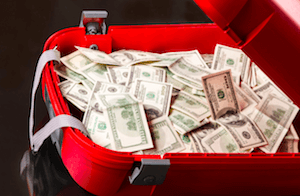
But selling a stock short can severely punish investors — especially if they don’t understand the risks.
What Is Short Selling?
You can win on a bet — no matter which way the stock is moving — as long as you’re guessing the right direction. Short selling allows you to invest in stocks even when you think that their share price will decrease.
Unlike typical long investors, who buy hoping that share prices will increase, being on the short side of the position, or a short seller,
is the exact opposite. You’re actually counting on the shares decreasing in value. Naturally, that’s a little counterintuitive for many investors.
When you think that a stock’s price will decline, you can tell your brokerage firm to short the stock for you. Essentially, you’re borrowing shares from the brokerage and then selling them; when — or rather, if — the price declines, you purchase the shares yourself at a lower price, return those “borrowed shares” to the brokerage, and lock in your profit. The brokerage earns a commission on the transaction and a small amount of interest in most cases, depending on how long you borrow the stock.

 Whether claims are due to natural disasters or man-made ones, the insurance industry has had several huge payouts to make over recent years. This list sums looks back at some of the biggest insurance payouts.
Whether claims are due to natural disasters or man-made ones, the insurance industry has had several huge payouts to make over recent years. This list sums looks back at some of the biggest insurance payouts. I have a confession to make: I lose money on my rental property every month. But I’m OK with that. I’ve got a long-term plan. Or I’m still delusional and hoping for a turnaround in the housing market. Either way, I stubbornly refuse to lose $30,000 in home equity by selling. I’d rather pay $300 a month out of my pocket in the hopes of hanging on to what little equity I have left.
I have a confession to make: I lose money on my rental property every month. But I’m OK with that. I’ve got a long-term plan. Or I’m still delusional and hoping for a turnaround in the housing market. Either way, I stubbornly refuse to lose $30,000 in home equity by selling. I’d rather pay $300 a month out of my pocket in the hopes of hanging on to what little equity I have left. Periodic review of our personal finances extends to many areas. Portfolio rebalancing helps your investments match changing time horizons and risk tolerances. As our families grow or coverage options change, we must review our
Periodic review of our personal finances extends to many areas. Portfolio rebalancing helps your investments match changing time horizons and risk tolerances. As our families grow or coverage options change, we must review our 
 My wife and I budget a little differently than most families. We budget with a credit card. We use a credit card for most of our purchases instead of cash or checks, and use that to monitor our family’s monthly spending.
My wife and I budget a little differently than most families. We budget with a credit card. We use a credit card for most of our purchases instead of cash or checks, and use that to monitor our family’s monthly spending.